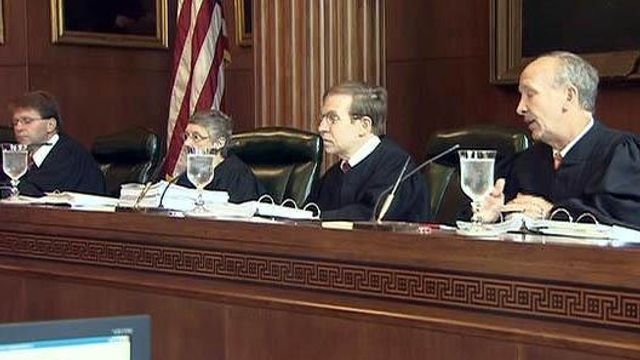High court hears case on gubernatorial power
In a hearing that attracted political and legal power-brokers, the state Supreme Court on Tuesday heard arguments about whether North Carolina's governor can legally shift money from special funds to help balance the state budget.
Posted — UpdatedTo deal with a state economy reeling from the combination of the dot-com bust and the Sept. 11 terrorist attacks, former Gov. Mike Easley raided various funds in February 2002, seizing $1 billion to help cover a mounting deficit. Included in those funds was $80 million from the Highway Trust Fund.
Two men who helped create the Highway Trust Fund in the late 1980s, former Transportation Secretary Jim Harrington and former state Sen. W.D. Goldston, an Alamance County Democrat, sued over the move, saying money raised through gas taxes that goes into the trust fund is earmarked for specific highway projects.
A Wake County judge dismissed the case two years ago, ruling that Easley is constitutionally required to maintain a balanced budget, so he had the authority to use highway money in the face of a deficit. A divided Court of Appeals overturned that decision last fall, ruling that Easley needed legislative approval to transfer money to the General Fund.
Former Supreme Court Chief Justice Burley Mitchell represented the state in Tuesday's court hearing, while former Associate Justice Bob Orr argued the case for Harrington and Goldston.
I. Beverly Lake Jr., another former North Carolina chief justice, former Govs. Jim Hunt and Jim Holshouser House Speaker Joe Hackney were among those attending the hearing.
The extensive interest "says it's a close case," Hunt said. He said he believes Easley was correct in using Highway Trust Fund money to balance the budget, saying the state constitution gives him that power.
"Somebody's got to be the final decision-maker, and I think the governor is that person," he said after the hearing.
Gov. Beverly Perdue twice took money from special funds last year to help pay state bills amid a deficit, including the lottery reserve fund, the Clean Water Trust Fund and the public school building and textbook funds.
Lake said those supporting Easley's move are trying to "take an easy issue and make it complicated."
Associate Justice Patricia Timmons-Goodson recused herself from the case, meaning six justices will decide the issue. A 3-3 decision would mean the Court of Appeals ruling would stand as the final ruling on the matter.
The Supreme Court decision is expected by the end of the year.
• Credits
Copyright 2024 by Capitol Broadcasting Company. All rights reserved. This material may not be published, broadcast, rewritten or redistributed.






